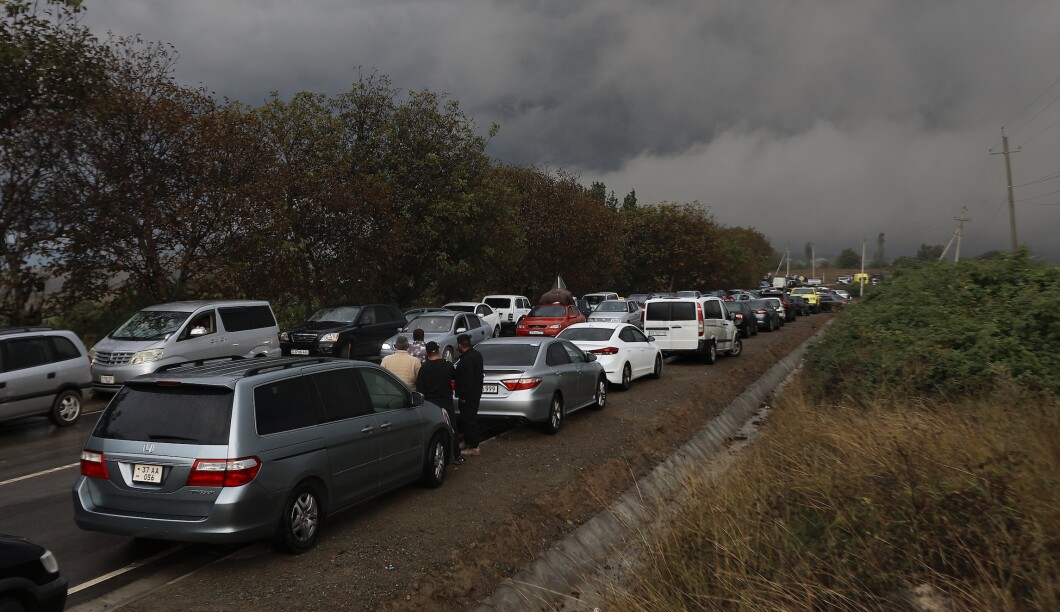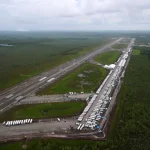
A bitter territorial dispute between Armenia and Azerbaijan is eroding Russia’s ties with a traditional ally, a crisis that could strengthen the American relationship with an erstwhile Kremlin client and possibly increase friction between the United States and its wayward NATO partner, Turkey.
Azerbaijan, with Turkey’s endorsement, has seized control of Nagorno-Karabakh, a disputed region populated mostly by ethnic Armenians who have begun to flee en masse for Armenia’s national borders. Armenia, a longtime Russian dependent, is finding no sympathy in Moscow, where Russian officials have expressed “revulsion” at bitter Armenian complaints and accused the government there of seeking closer relations with the West.
DEMOCRATS DIVIDED OVER BOB MENENDEZ’S FUTURE IN THE SENATE
“We believe that the authorities in Yerevan are making a big mistake, deliberately trying to ruin Armenia’s centuries-long multifaceted ties with Russia and making the country hostage to the West’s geopolitical games,” the Russian Foreign Ministry said Monday. “We are sure that the vast majority of the Armenian people realize that.”
That acrimonious diplomatic dispute erupted as ethnic Armenians began to pour en masse over the border amid a mass exodus of ethnic Armenians from Nagorno-Karabakh, the scene of two brutal wars since the fall of the Soviet Union. Azerbaijani troops have surged across the region in recent days, despite Russia’s nominal presence as a peacekeeping force, spurring thousands of ethnic Armenians to flee. There is reportedly a 60-mile line of cars from Nagorno-Karbakh to Armenia.
“The responsibility for such a development of events will fall entirely on Azerbaijan, which has adopted the policy of ethnic cleansing, and on the peacekeeping troops of the Russian Federation in Nagorno-Karabakh,” Armenian Prime Minister Nikol Pashinyan said Sunday. “The security systems and the allies we have relied on for many years have set a task to demonstrate our vulnerabilities and justify the impossibility of the Armenian people to have an independent state.”

A delegation of senior U.S. officials arrived in the capital city of Yerevan on Monday as ethnic Armenians poured into the country.
“The United States continues to support Armenia as it advances a dignified and durable peace in the region,” United States Agency for International Development Administrator Samantha Power’s team said as she arrived in Yerevan. “The United States is deeply concerned about reports on the humanitarian conditions in Nagorno-Karabakh and calls for unimpeded access for international humanitarian organizations and commercial traffic.”
The Nagorno-Karabakh dispute has simmered along for decades, marked by occasional outbreaks of brutality. The autonomous district was prevented in 1988 by Soviet rulers from being incorporated into Armenia, the border of which is separated from Nagorno-Karabakh by about 6 miles of the wider Azerbaijani territory. It declared independence in 1991 and then was convulsed by a war that saw Karabakh Armenian forces perpetrate a massacre of Azerbaijani civilians in Khojaly, according to Human Rights Watch.
“The Armenians of Nagorno-Karabakh are still facing the threat of ethnic cleansing,” Pashinyan said Sunday. “And if real conditions for Nagorno-Karabakh Armenians to live in their homes and effective mechanisms of protection from ethnic cleansing are not created, the chances that the Nagorno-Karabakh Armenians will see leaving their homeland as the only way to save their lives and identity is greatly increased.”
The dispute is fraught with geopolitical cross-pressures shaped by the ethnic and religious communities involved. Greece, which joined NATO in 1952, boasts “very strong [relations with Armenia] both emotionally and historically,” as the Greek Foreign Ministry puts it, due in part to their shared Christian religion and their common experience under Ottoman Turkish rule. Azerbaijan, a Turkic Muslim state, has close ties with Turkey, a historic anchor of NATO’s southeastern flank.
“I wholeheartedly congratulate the victorious Azerbaijani army for both its historic success and its humanitarian attitude towards civilians,” Turkish President Recep Tayyip Erdogan said Monday. “With the latest victory, new windows of opportunity have opened for a comprehensive normalization in the region.”
That salute has an ominous ring for Armenia. Erdogan delivered that praise during a meeting with Azerbaijani President Ilham Aliyev in Nakhchivan, an Azerbaijani district that is separated from the rest of Azerbaijan by Armenian territory due to Soviet-era decisions about how to organize the borders.
“The land link between the main part of Azerbaijan and Nakhchivan (the exclave) was thus cut off,” Aliyev said Monday.
Turkish-Azeri cooperation contributed to the Armenian need for Kremlin backing, but Yerevan’s relations with Moscow have deteriorated since 2018 when the so-called Velvet Revolution protest movement forced the resignation of a Russia-friendly prime minister ahead of snap elections that brought Pashinyan to power.
“It is concerning that instead of heeding our desire for an independent, sovereign, free and democratic state, some of our partners are increasingly making efforts to expose our security vulnerabilities, putting at risk not only our external, but also internal security and stability, while violating all norms of etiquette in diplomatic and interstate relations, including obligations assumed under treaties,” Pashinyan said.
CLICK HERE TO READ MORE FROM THE WASHINGTON EXAMINER
Russian Foreign Minister Sergey Lavrov’s team accused Pashinyan of undercutting a plan by the Russia-dominated Collective Security Treaty Organization to send an observer mission to the region.
“It was largely due to the inconsistent position of the Armenian leadership, which preferred to zigzag and turn to the West instead of steadily working with Russia and Azerbaijan, that the implementation of the high-level trilateral agreements reached in 2020-2022 stalled,” the Russian Foreign Ministry insisted.





